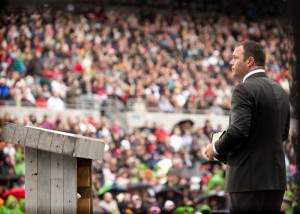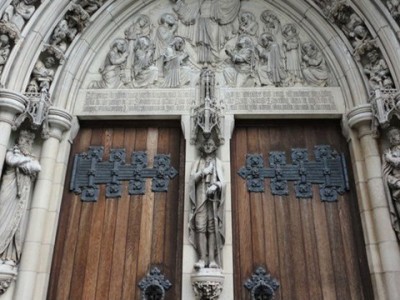Editorial: My Part in The Rise and Fall of Mars Hill
I don’t think I’ve heard this much buzz around a podcast since Serial came out in late 2014. Remember that show? For a few tantalizing months that year, we were all wrapped up in the story of a young man and a murdered girlfriend. But do you know what else happened in late 2014?
 If you listen to Christianity Today’s sudden blockbuster The Rise and Fall of Mars Hill, you do. A week before Sarah Koenig began spinning her tale of a man who was imprisoned for a crime he didn’t commit (or maybe he did? I’m still not sure, seven years later), Mark Driscoll submitted his resignation from Mars Hill, the church he founded in Seattle. The megachurch would spend the next two months loudly imploding before shutting its doors at the end of the year, fracturing its eleven sites into individual churches.
If you listen to Christianity Today’s sudden blockbuster The Rise and Fall of Mars Hill, you do. A week before Sarah Koenig began spinning her tale of a man who was imprisoned for a crime he didn’t commit (or maybe he did? I’m still not sure, seven years later), Mark Driscoll submitted his resignation from Mars Hill, the church he founded in Seattle. The megachurch would spend the next two months loudly imploding before shutting its doors at the end of the year, fracturing its eleven sites into individual churches.
And, a lot like Serial, the new podcast has generated discussion, buzz, and maybe even some self-reflection from a lot of people. “We tend to look at [results] alone and go, ‘oh, give him a bigger platform…’” Skye Jethani of The Holy Post told The Rise and Fall of Mars Hill host Mike Cosper during an interview. “For me, that’s one of the big takeaways from these kinds of stories and from your podcast. We’re just measuring and focusing on the wrong fruit.”
Some may say that God’s favor on successful ministries is clear, even when the leader is accused of misconduct, because He is using them to accomplish His purposes. But, as Jethani also notes in that interview, “[God] uses prostitutes, and evil kings like pharaoh; He uses Judas, He uses frogs, He uses the jawbone of an ass…He uses all kinds of things to accomplish his purposes. Just being used by God, in and of itself, is not evidence that you belong to God.”
American Evangelicals ignoring the evil acts of charismatic men is nothing new. But what is new is me, personally, realizing that I’m a part of the problem.
A month after Rick Warren preached Mars Hill’s last sermon, I wrote an article also called “The Rise and Fall of Mars Hill Church.” (I’m not going to press charges against CT.) In it, I traced a brief history of the church in a frankly gross way; while I acknowledged Driscoll’s moral failings, I never truly reckoned with them in the article. I even linked to his book on Amazon. The last line of the article read, “from Spring 1996 to Winter 2014, God did an amazing work in Seattle. To be sure, the work did not start in 1996, nor did it end in 2014; but for those almost 19 years, He used as part of that work a man and a church. The man was Mark Driscoll, and the church was Mars Hill.”
And, while nothing about that line is strictly untrue, it ignores a dangerous reality: that Driscoll had built his church and his platform upon his own domineering, abusive leadership style. That the church was a cult of personality centered on Mark. That he was misusing the church and its members for his own enrichment, in violation of his own repeated admonition to “use things to love people, not the other way around.”
 See, my faith came of age in the middle years of Mars Hill Church. I followed their podcast, and a lot of my early faith (as well as the culture of the Christians around me) was influenced by it, directly or not, as well as a few other celebrity pastors of the time. Before we were married, my wife and I would listen to Driscoll sermons (and sermons of other pastors) and discuss them. Our relationship wasn’t exactly built on Driscoll’s preaching, but it was a touchstone in our early life together.
See, my faith came of age in the middle years of Mars Hill Church. I followed their podcast, and a lot of my early faith (as well as the culture of the Christians around me) was influenced by it, directly or not, as well as a few other celebrity pastors of the time. Before we were married, my wife and I would listen to Driscoll sermons (and sermons of other pastors) and discuss them. Our relationship wasn’t exactly built on Driscoll’s preaching, but it was a touchstone in our early life together.
Not to mention, I had started work on Redeeming Culture that point, which grew directly out of James Harleman’s work with Film and Theology as a pastor at Mars Hill. Listeners to The Rise and Fall of Mars Hill will have heard Harleman’s voice in an early interview, and to be clear, Harleman himself is not on trial here; I’ve been privileged to be able to interact with James several times over the past few years and I’ve found him to be a kind, thoughtful, and reasonable person to deal with. But the genesis of this sort of cultural analysis through a theological lens was kick-started in a lot of corners of the internet by him while he was a pastor there. The story of Mars Hill is inextricable from so many similar stories; Reel World Theology founder Mikey Fissel also got a lot of inspiration from Harleman’s work, and it’s not overstating things to say that Reel World Theology is what it is today in part because of Mars Hill, and this type of cultural theological work has become a core part of who I am and how I see myself.
So hearing that the church had disintegrated, I felt immediately defensive of the man and suspicious of the elders who recommended he be removed from the pulpit. What was my faith if the man who spoke into it so loudly was disqualified?
The Council of Nicaea debated a similar matter (along with the doctrine of the Trinity, the Incarnation, and Easter): namely, was the baptism of a person who later turned out to be a heretic still valid?
They came to a conclusion that hews closely to Paul’s words in Philippians 1:15-18: God’s power to save is not tied to the righteousness of the baptizer, or even the efficacy of the baptism. Whether in pretense or in truth, baptism in the name of God is accomplished by the power of God. And that’s the reality of Driscoll’s words, as well. I cannot accurately gauge whether his sermons were delivered in pretense or in truth, for personal gain or for the Kingdom.
But the question is, are they true? Many of them weren’t. But the ones that were do not diminish because of the man who spoke them. God’s words are more powerful than their sinful speakers.
My article didn’t wrestle with that at all, though. Instead, the article I wrote reflected my defensiveness; I ignored the pain and destruction he caused and focused instead on the fruit.
And after writing that piece, I promptly and intentionally stopped thinking about Mars Hill and Mark Driscoll.
The ability to do that was, I’m learning through the podcast, a huge privilege. My involvement with Mars Hill had been tangential at best, I lived on the other side of the country, I never met the man, and I saw myself in all of his stories. As he traveled to Scottsdale to restart his ministry, I was vaguely aware and somewhat concerned about his quick return after such a public failure.
But then the podcast came out. The weight of the abuse, gaslighting, and domineering spirit within the church’s leadership really struck me in a personal way through the stories of Paul and Bent in episode six, two elders and employees at Mars Hill who were thrown “under the bus” in Driscoll’s attempt to consolidate his power at the church. What does it say about my own obliviousness, about the way the American church so often fails, that it took the abuse hitting men—long after the stories of Driscoll harming women‐for the reality of Driscoll’s danger to feel personal to me?
A week prior, the episode titled “The Things We Do to Women,” responds to the common objection: “what about all the good he did?” Cosper redirects to a more crucial question: “is it worth the damage?”
The statement hit me like a ton of bricks, because I had been completely oblivious to the damage when I wrote that article. I put myself in the place of those who had been hurt by Driscoll over the course of Mars Hill’s life, and those who continue to be hurt today at The Trinity Church in Arizona, and I realized how my article would’ve looked to their eyes.
It wasn’t just Driscoll’s abusive behavior behind closed doors; the wounds in the church were inflicted from the pulpit, as well, and I had just never seen it. Women were harmed by his teaching on women. Men were harmed by his teaching on men. Children were harmed. Communities were broken. Mark’s domineering concept of the world was all-encompassing and not Biblical; and the good done in Seattle in that time most certainly was not worth the damage.
 The fact is, God worked in Seattle despite Mark Driscoll’s abuse, not through it—I wasn’t clear about this in my 2015 article—and in many ways, the harm the church caused was greater than the redemption it wrought. Mars Hill saw success as a church during its life by God’s grace alone, and its success did not merit or excuse its leader’s misconduct. And the people who were hurt are not acceptable losses; a church should not have people “on the bus or under it.”
The fact is, God worked in Seattle despite Mark Driscoll’s abuse, not through it—I wasn’t clear about this in my 2015 article—and in many ways, the harm the church caused was greater than the redemption it wrought. Mars Hill saw success as a church during its life by God’s grace alone, and its success did not merit or excuse its leader’s misconduct. And the people who were hurt are not acceptable losses; a church should not have people “on the bus or under it.”
I’ll continue to listen to The Rise and Fall of Mars Hill, with its accounts from people who were harmed directly by the church, in the hopes that through it I can discard the untrue things I learned from him, identify similar abuses in the organizations I’m a part of today, and wrestle with the ways in which I am still complicit in the damage he’s done. It’s a part of my own personal reformation: Christ’s sanctification. I hope this article can serve as my apology for the harm I caused for my last one.
This post was updated on August 13 with a note about Mars Hill pastor James Harleman’s influence on Reel World Theology.







